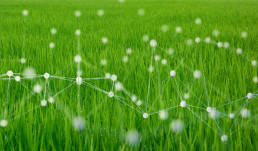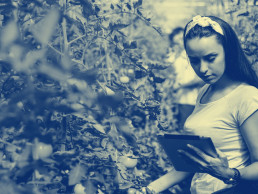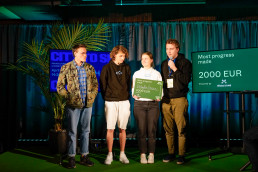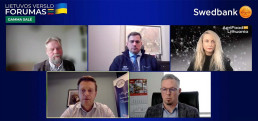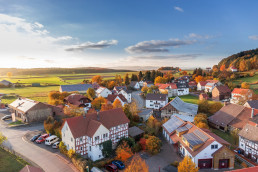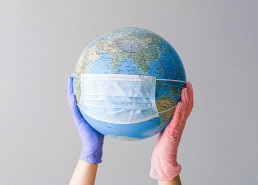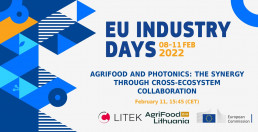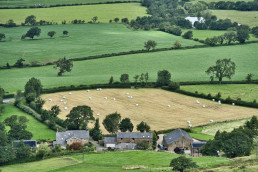FlexiGroBots: Commercial Exploitation Roadmap
Digital Innovation Hubs (DIHs) are crucial for the modernization and creation of an advanced and innovative agri-food ecosystem with a balance between financial and environmental sustainability across Europe. They are a great and convenient way to reach the end user, be it a farmer or a business entity. However, DIH is not yet a fully exploited tool in the agri-food ecosystem. Why is that? What determines this? IIs there a lack of an unconventional approach that would lead to even greater interest in Digital Innovation Hubs across Europe? This project will focus on DIHs and new business model offerings that will commercially enable the services and tools developed during the FlexiGroBots project and create value for the entire agri-food ecosystem.
What do we want to do?
Our goal is to provide the best opportunities to develop and commercialize the FlexiGroBots platform and the individual pilot hardware or software components being developed during this project. To this end, we have created a new, attractive and unconventional approach. During this task, such business models as Hardware-as-a-Service (HaaS) and Software-as-a-Service (SaaS) will be explored as viable alternatives to conventional approaches and business practices.
In order for this idea to reach its full potential, during modeling, a particular focus will be given to the activities and operational models of agriculture and / or robotics focused on Digital Innovation Hubs throughout Europe. It is not a coincidence that DIHs have been chosen as our key partners in promoting the use of the innovations created during the project. They are becoming more and more important players in the innovation ecosystem in Europe, looking for opportunities to enhance the quality of their services. Therefore, during this project we will create value for all actors of the ecosystem and this will allow us to achieve the maximum possible results.
Today, DIHs are already a really reliable partner for the end-users (farmers and agriculture industry), so this collaboration will help us reach end users in different regions directly. Therefore, we will be able to sustain pilot demonstrations and promote the test-before-invest approach to new product and service uptake by interested parties.
This DIHs-oriented business model development strategy will not only enable the widespread empowerment of the products developed during the project, but will also strengthen the entire ecosystem of the sector and build a trust-based network between our technology and service stakeholders.
In addition, it is worth noting that this task is closely linked to other dissemination and communication activities and provides a basis for further technology transfer facilitation and project result long-term sustainability planning.
What if we were a little more specific?
The broad aim of this task is:
- To develop the appropriate business models for the services and tools provided by each Pilot implemented within FlexiGroBots (3 in total) and for the FlexiGroBots platform developed by ATOS, as well as, for the integration of the Pilots’ services within the platform.
- To create the necessary ecosystem through which the solutions developed within the project can be commercially exploited – protagonist to this will be the involvement of DIHs
What have we done so far?
However, it is not only goals or a vision. We have already made a huge progress that allows us to hope for even greater success in the future.
- We have already identified the individual KER (key exploitable results) of each pilot and the platform and have a first picture of the potential business model canvas that we could follow for the further development of the respective business models. This was achieved through a questionnaire, which was prepared by us and distributed amongst partners.
- We have initiated a series of internal meetings with the partners involved in the implementation of the pilots and the development of the platform. These meetings are necessary in order for us to explore and crystallize the separate elements of the business model, i.e. exploitable elements, value propositions, distribution and service delivery models, etc. The outcome of these meetings – the first draft of the business models – will soon be available.
We are in the process of mapping the currently existing ecosystem. Once this is done, we will be able to communicate with actors of the ecosystem more efficiently, establish a reliable relationship with them and involve them – especially DIHs – in the exploitation of the project’s outcomes.
EIT Food is looking for women entrepreneurs to help them develop sustainable businesses
- The aim is to close the current gender gap, where women hardly have a leadership role in the sector.
- This programme includes support, training and personalized mentoring for six months, as well as prizes of up to 10,000 euros. Applications are open until June 13.
Women entrepreneurs are wanted. They should have started a business or project related to agrifood sector less than two years ago. The European organization EIT Food has once again launched the Empowering Women in Agrifood (EWA) programme to support projects in this sector founded by women. This programme, launched last its second edition, been a huge success. It was activated in eight countries and received 269 applications.
The aim of the EWA programme is to close the current gender gap because women hardly have a leadership role in this sector. For six months, selected women are continuously supported to advance their projects, with specific online training and personalised business mentoring. In addition, they will access investors, experts and corporatives to take their businesses to the next level. Beneficiaries will have the chance to win up to 10,000 euros.
Even though there are more women (52%) than men in Europe, female entrepreneurs represent only a third of the self-employed in the EU. Due to some different factors, entrepreneurship is currently a less attractive option for women than for men. This is worse when we move to rural areas and agrifood businesses according to the latest statistics published by the European Statistical Office. In 2016, women accounted for 28% of the top positions in agricultural and livestock farms in the European Union, with a remarkable low rate amongst women from RIS regions.
Furthermore, the lack of representation of women in rural areas not only affects entrepreneurship, but women also face obstacles that prevent them from fully developing and choosing positions of responsibility in rural companies. Therefore, and especially in rural areas, female creativity and entrepreneurial potential are an under-exploited source of economic growth that should be further explored. The European Commission is working with EU countries to overcome these challenges and encourage more women to start their own companies.
Applications are open until June 13. More information here.
About EIT Food
EIT Food is the leading initiative in food innovation in Europe. It works to make the food system more sustainable, healthy and trustworthy. It is one of eight innovation communities established by the European Institute of Innovation and Technology (EIT), an organisation which is independent of the EU and was created in 2008 to promote innovation and entrepreneurship.
The students of Vilnius University of Applied Sciences became the winners of the Hack AgriFood Challenge Lab'22 by EIT Food
On May 4-5, the online Hack AgriFood Challenge Lab'22 by EIT Food was organized. During the event, students and other innovators had the opportunity to address important challenges in the agrifood sector by offering solutions that could contribute to shaping a sustainable and efficient future for the sector, and to learn from top level experts in various business fields.
"This Challenge Lab, initiated by EIT Food, is a great opportunity for young people to try themselves, test their ideas and gain experience from mentors - real experts, - with whom, normally, they would not be able to meet. I am glad that this year the students of Vilnius University of Applied Sciences participated in this hackathon very actively, gained knowledge that cannot be learned during regular lectures, and met innovators not only from different faculties, but also from other Lithuanian cities. I believe that we will continue this initiative in the future and provide an opportunity for young innovators to improve, learn and win cash prizes,” said the organizer of the event Kristina Šermukšnytė-Alešiūnienė, Director of AgriFood Lithuania DIH.
The main cash prize of the Challenge Lab - 2000 euros - was won by the team "Tricked", consisting of students of the Agribusiness Technologies study program of the Faculty of Agrotechnologies of Vilnius University of Applied Sciences. Team members Gabrielė Avgustaitytė, Tautvydas Lazauskas, Robertas Gribauskas, Arnas Astravas ir Meda Balsevičiūtė-Yildirim offered Lithuania a really innovative and sustainable idea - "Growing rare mushrooms in coffee grounds".
We asked the lead of the team Gabrielė Avgustaitytė to share her thoughts and impressions.
Who encouraged/what motivated you to take part in the Hack AgriFood Challenge Lab'22 by EIT Food?
We were encouraged by our lecturer Gražina Palaitytė and driven by the desire to learn something new.
What is the main idea of your solution? How did you come up with it?
Our idea is to grow mushrooms in coffee grounds. During the hackathon, we tackled two challenges: the use of alternative proteins and the re-use of coffee grounds, which are currently simply being discarded. The idea itself came naturally, because one of our team members is a vegan, who is constantly looking for alternative proteins because she cannot get them from meat or other non-vegetable products. In addition, in surveys conducted before the hakathon, we noticed that people are very interested in alternative proteins, and their demand is increasing.
What was the hardest part for you during the Challenge Lab?
The hardest part, perhaps, was finding the information to explain in detail how the whole process and the logistics would work.
What impressed you the most?
I liked the fact that among the mentors we found like-minded people who had experience in growing mushrooms in Lithuania. Of course, not in coffee grounds, but we got useful information about the varieties and the process itself. It was fun to interact with professionals in their field.
What advice would you give to people who are afraid to participate? Would you recommend others to join Challenge Lab in the future?
No one should be afraid, trying does not hurt! We definitely encourage everyone to participate. The new experience and knowledge gained during the Challenge Lab is very useful for all of us. No one should miss this chance!
Announcing the winners of international aquaculture and mobility hackathon "City to Sea"
The 48-hour international hackathon "City to Sea" took place from April 22 to 24 in Riga. 117 participants from 18 countries were competing for the main prizes. After 121 meetings with mentors and the idea evaluation process by an international jury, in total six teams behind the best business ideas for aquaculture and mobility challenges received 18 000 euros.
"The participants of the hackathon confirmed that we are capable of creating market oriented and competitive ideas in a relatively short time. In total, 21 teams developed their ideas during the hackathon. All of them will have the opportunity to continue working on the development of their ideas after the event. It is a good start for moving towards the goal of the mission “Sea 2030” - address issues regarding climate change, clean mobility pollution and the circular economy by offering innovative solutions for the clean water cycle,” points out one of the members of the hackathon jury, and the director of the Latvian Investment and Development Agency (LIAA) Kaspars Rožkalns.
For the Water track, 11 teams developed their ideas during the hackathon. In the nomination "The most advanced solution", 3500 euros were awarded to team “P-Agro”, which develops an affordable technology that recovers phosphorus (P) from wastewater. With the support from the EIT Food in the nomination “The highest growth potential” 3500 euros were awarded to the team “SUBmerge”, which develops a submarine that can detect pollution and collect data from different depths and locations. Meanwhile, the nomination “The biggest progress made” and 2000 euros received a team “N-LAB / Wise River” for developing unmanned water vehicle.
For the Mobility track, 10 teams were looking for solutions to challenges put forth by Riga City Council. With the support from Riga City Council in the nomination “The biggest progress in hackathon” 2000 euros went to the “Pray for Green '' solution, which aims to reduce insurance costs for companies and decrease the 'sick days' by incentivizing employees to shift active mobility. In the nomination "Biggest growth potential", 3500 euros were awarded to team "Dumb 2 Smart lights", which retrofits street lanterns into smart city hubs enabling electric car and scooter charging options, IoT sensors, 5G antenna placement, and other solutions. The nomination “The most advanced solution” and 3,500 euros from LIAA went to “4city”, which offers a robust four-wheel electric scooter with improved balance, as well as an integrated box for storing belongings in the electric scooter.
The hackathon participants had the opportunity to use “Copernicus Marine Service” satellite data, which helps to assess the state of the Baltic Sea and develop solutions to improve the situation.
The City to Sea hackathon was organized by the LIAA, bringing together government, private, and research organizations. The event was organized by Riga Technical University (RTU) and the innovation movement “VEFRESH” with the support of the European Institute of Innovation and Technology (EIT) innovation community “EIT Food” and “EIT Urban Mobility”, Lithuanian digital innovation hub “AgriFood Lithuania DIH”. The cooperation partners of the hackathon are the Freeport of Riga Authority, Riga City Council, “Accenture”, “Latvijas Mobilais telefons”, the Scientific Institute for Food Safety, Animal Health and the Environment “BIOR”, the Latvian Maritime Academy, and the Latvian Institute of Hydroecology. The implementation of the hackathon was supported by the ERDF and the Norwegian Financial Mechanism.
The City to Sea hackathon is part of the mission Sea 2030. The mission's core objective is to address issues regarding climate change, pollution, and the circular economy by creating an environment conducive to the creation of innovative projects and sustainability.
Hybrid City to Sea hackathon
From April 22 to 24, powered by the Mission "Sea 2030”, Riga will host an international 48-hour hackathon "City to Sea". Hackathon will promote the development of innovative and sustainable solutions. The City to Sea will foster ideas that could potentially develop novel world-class technologies and solutions for aquaculture and mobility sectors alike. Applications for hackathon are open until April 15.
Hackathon "City to Sea'' is organized by the Latvian Investment and Development Agency (LIAA), bringing together public administration, private and research sector institutions. Alongside LIAA, it is facilitated by Riga Technical University (RTU) and the innovation movement VEFRESH with the support of the European Institute of Innovation and Technology (EIT) innovation community EIT Food and EIT Urban Mobility, as well as the Lithuanian digital innovation centre Agrifood.
The Baltic Sea region is home to more than 85 million people living next to one of the most polluted and densely trafficked seas in the world. City to Sea hackathon will address this by aligning innovative ecosystems with leading initiatives such as New European Bauhaus and the European Green Deal.
“Our Mission “Sea 2030 " strives to gradually restore a crucial resource for the region - the Baltic Sea. It does so by creating conditions and incentives for the burgeoning of a blue and green economy. The innovations to emerge in this process will be scaled globally, enabling Latvia to not only contribute solutions, but also gain traction from global investors. Our next step is to set up an acceleration fund to provide a pipeline of development opportunities for the ideas created during hackathon and to funnel solutions towards maturity and market”, explained Kaspars Rožkalns, the director at LIAA.
The hackathon will address challenges around: Aquaculture and blue biotechnology, active and future mobility, shipping and green ports, energy and public transport, pollution reduction, and more. For a more detailed information about challenges and hackathon itself please visit our official homepage: www.citytosea.eu
Thematically, urban mobility aims to create more liveable spaces in our cities by providing climate friendly, increasingly digitised and inclusive transport solutions. Aquaculture activities are expected to foster economic growth, contributing to food supply chains, environmental protection, and digitalisation of ports.
The hackathon will gather researchers, entrepreneurs, and field experts looking to create and develop new solutions to improve the quality of life around the Baltic sea and its cities. We welcome you to join as an individual or a team, with or without an idea. The total prize budget is 9000 EUR per track. The best teams will be awarded cash prizes and have a chance to pilot solutions with the major industry players.
Major supporters, challenge providers include Riga City Council, Freeport of Riga Authority, Accenture, LMT, Institute of Food Safety, Animal Health and Environment “BIOR”, Latvian Maritime Academy (LMA), Latvian Institute of Aquatic Ecology (LIAE), and more.
Lietuvos agromaisto sektorius kuria aukštą pridėtinę vertę pasiūlydamas pasauliui tai, ko negali kiti.
„XVII amžiuje cukraus pasaulyje buvo pagaminama vos keturi šimtai kilogramų ir tai buvo išskirtinės prabangos prekė. Prieš Pirmąjį pasaulinį karą cukraus jau buvo pagaminama dvidešimt milijonų tonų, o šiandien jo yra visur – per šį laikotarpį jis atpigo daugiau nei 170 kartų. Įvykusi technologinė permaina pasiekė neįtikėtinų rezultatų, tačiau kai kurios valstybės, nesugebėjusios judėti su šiais pokyčiais, taip ir neatsigavo“, – tokia įžanga skaitmeninių inovacijų centro „AgriFood Lithuania DIH“ ir „EIT Food“ inicijuotą diskusiją Lietuvos verslo forume apie aukštos pridėtinės vertės agromaisto sektorių Lietuvoje kaip misiją (ne)įmanoma pradėjo diskusijos moderatorius.
Europoje diskusijų nėra – tai prioritetinis sektorius
Jei su pateiktomis nuomonėmis ar įžvalgomis galima aršiai diskutuoti ir išsiskirstyti be susitarimo, su skaičiais ginčytis sudėtinga. Pranešimą pristatęs „EIT Food RIS“ politikos tarybos narys, Lietuvos maisto eksportuotojų asociacijos direktorius ir Lietuvos klasterių tinklo prezidentas Giedrius Bagušinskas pateikė ne vieną svarbų statistinį faktą apie žemės ūkio ir maisto sektorių.
Žemės ūkio, maisto ir gėrimų sektorius sukuria daugiau nei 8 proc. Europos Sąjungos BVP, jame dirba virš 7,5 proc. visų dirbančiųjų (t.y. beveik penki milijonai darbuotojų). Be to, ši pramonės šaka sugeneruoja 9 proc. visų pramonės šakų kuriamos vertės. Lietuvoje skaičiai panašūs. Tai – 7,4 proc. BVP. Be to, virš 70 proc. gamyboje naudojamos žaliavos paruošiama Lietuvoje. Galiausiai, tai vienas iš pagrindinių darbdavių regionuose, turintis ypatingai reikšmingą vaidmenį mažesnių miestų ir kaimų vystymesi.
„Valstybiniu mastu mes pernelyg viską susmulkinome, sukoncentravome į lentynėles ir per mažai pasitikime verslu. Smulkiam ir vidutiniam verslui parama inovacijoms ir konkurencingumo didinimui yra gyvybiškai svarbi, tačiau nesuteikdami skatinamųjų priemonių (nebūtinai tiesioginio finansavimo) mes neišnaudojame egzistuojančio potencialo. Be to, visos priemonės yra dalijamos tiesiogiai valstybinių institucijų ar agentūrų ir nėra leidžiama pačioms verslo asocijuotoms struktūroms nuspręsti, kur labiausiai verta investuoti. Europos Sąjungoje yra ne viena šalis, kuri verslo skatinimo paramos distribuciją yra linkusi patikėti verslo asociacijoms“, – mintį labiau pasitikėti verslu ir skirti didesnį dėmesį stambioms įmonėms išreiškė Lietuvos maisto eksportuotojų asociacijos „LitMEA“ direktorius G. Bagušinskas.
Skaitmeninių inovacijų centrai lyg šeimos gydytojas
„AgriFood Lithuania DIH“ ir „EIT Food“ inicijuotoje temoje kalbėjęs Lietuvos inovacijų centro direktorius dr. Mantas Vilys pabrėžė, kad inovacijos klesti tada, kai yra didelis neapibrėžtumas, egzistuoja nemaža rizika, tačiau taip pat galima ir didelė grąža bei nauda. Labai panašiai šiandien gyvena agromaisto sektorius. Vykstanti dvejopa – skaitmeninė ir žalioji – transformacija kuria naujas žaidimo taisykles ir formas, kurios turės didžiulės įtakos sektoriaus ateičiai ir joje veikiančių verslų raidai.
Kaip teigia Lietuvos inovacijų centro direktorius, atsirandantys iššūkiai skatina įmones investuoti į priemones, galinčias kurti aukštesnę pridėtinę vertę. Taip pat vartotojų lūkesčiai, žiedinė ekonomika, socialinė atsakomybė ir skaitmeninė revoliucija verčia verslus permąstyti savo veiklos modelius ir ieškoti būdų, kaip prisitaikyti ir būti konkurencingais ne tik vietinėje rinkoje, bet ir visame pasaulyje. Anot M. Vilio, neužteks agromaisto sektoriaus veikėjams galvoti tik apie atskirus atvejus ar priemones, bus būtina mąstyti kompleksiškai ir net galvoti apie elementus, kurie anksčiau niekada nebuvo svarstyti.
„Vakarų rinkoje egzistuoja didžiulė konkurencija, todėl reikia labai gerai įvertinti, kas galėtų būti į konkurencinę kovą besiveržiančios įmonės sąjungininkai. Aš manau, kad skaitmeniniai inovacijų centrai yra būtent tas sąjungininkas, kurio reikia verslui. Jie būdami nešališki ir pelno nesiekiantys patarėjai lyg šeimos gydytojai gali padėti nepasiklysti technologijų, jų diegimo ir pasiūlos džiunglėse. Jie objektyviai gali padėti įsivertinti inovacijų taikymo galimybes, poveikį, sudėlioti veiksmų planą, padėti sumažinti investicijų riziką, padėti ieškoti naujų rinkų ar konkurencinio pranašumo bei supažindinti su reikiamos patirties turinčiais mentoriais visoje Europoje. Svarbu suvokti, kad pokyčių laikotarpyje išlieka ne stipriausi ir net ne protingiausi, bet tie, kurie sugeba geriausiai prisitaikyti prie kintančios aplinkos“, – patarimu pasitikėti ir išnaudoti skaitmeninius inovacijų centrus dalinosi Lietuvos inovacijų centro direktorius Dr. Mantas Vilys.
Agromaistas – Lietuvos proveržio sektorius
Diskusijos metu buvo kalbėta ir apie tai, kad visuomenė dažnai klaidingai įsivaizduoja pirminę agromaisto sektoriaus gamybą. Nesvarbu, ar tai būtų kviečių laukai, ar vištų ferma, tačiau diskusijos prelegentai tikino, jog įdiegtų pažangių technologijų šiuo metu netrūksta. Įvertinus agromaisto sektoriaus pramonės mąstą šalies ekonomikai, net ir nedidelis proveržis šiame sektoriuje gali generuoti tokią grąžą, kokios negali net ir didelis proveržis labai patraukliai skambančiame, tačiau mažame sektoriuje.
„Deja, šalyje agromaisto sektorius nėra matomas kaip inovatyvus proveržio sektorius. Tarptautinio lygio moksliniai tyrimai įrodė ir pagrindė, kad žemės ūkio ir maisto sektorius kitų sektorių kontekste turi didžiausią potencialą technologijų diegime, pritaikyme bei naujų produktų kūrime. Be to, šis sektorius turi didžiulę įtaką regionų ekonominiam vystymuisi. Sėkminga agromaisto sektoriaus raidai gali naikinti netolygumo skirtumus tarp didmiesčių ir provincijos, išlaikyti ir pritraukti jaunus bei talentingus žmones ir naujus verslus“, – teigė „AgriFood Lithuania DIH“ direktorė Kristina Šermukšnytė-Alešiūnienė.
Tarptautinė ekspertė pridūrė, jog į tai dėmesį atkreipti turėtų ir politikos formuotojai. Anot jos, įvertinus tai, kad naujajame programavimo periode didžioji dalis lėšų bus nukreiptos į regionus, negalima palikti žemės ūkio ir maisto sektoriaus nuošalyje, kadangi jo įtaka ir reikšmė regionų ekonominei plėtrai yra nenuginčijama. Todėl kyla klausimas, kokius rezultatus mes gebėtume pasiekti, jei šį sektorių paliktume nuošalyje? „Svarbu tai, kad ateinančio programavimo periodo metu Lietuva nacionaliniu mastu išsikeltų uždavinius ir žinotų, kokio sektoriaus ji nori po penkerių, dešimties ir dvidešimties metų. Svarbu, kad nebūtų mėtymosi ir nežinojimo. Be to, į sektorių iš skirtingų perspektyvų turi būti žiūrima sutelktai. Nesvarbu, ar tai būtų sumani specializacija, ar kaimo plėtra, ar Įgūdžių paktas. Kiekvienas šis planas tarpusavyje turi būti integruotas, o ne eiti atskirai“, – nuosekliai ir nefragmentuotai į sektoriaus ateitį siūlė pasižiūrėti skaitmeninių inovacijų centro direktorė.
Tradicinis nėra lygu neinovacinis
Diskusijos dalyviai pažymėjo, kad net ir paprasto kviečių lauko apdirbime naudojama daug inovacijų. Nuo didelių duomenų apdorojimo, įvairių sensorių, hyperspektrinių kamerų iki palydovų duomenų ir sunkiosios laukų technikos, kurios operatoriaus darbo vieta labiau primena kosminį laivą nei daugelio vaizduotėje išlikusį senovinį kombaino ar traktoriaus vairuotojo kabinos vaizdą.
„Pavyzdžiui, paukštynas, nors ir atrodo tradicinis užsiėmimas, tačiau dabar tai irgi inovacinė aplinka, turinti daugybę pažangių technologinių sprendimų, kurie kelia našumą ir kokybę. Pradedant nuo ventiliacinių, temperatūros palaikymo sprendimų ir daugybės kitų parametrų monitoringo bei valdymo iki robotizuotų linijų. Pas mus netgi buvo atvykę „Microsoft“ atstovai ir siūlė kartu vystyti skaitmeninius sprendimus“, – patirtimi dalinosi „Linas Agro Group“ valdybos pirmininko pavaduotojas, „PF Kekava“ valdybos pirmininkas, AB „Kauno Grūdai“ generalinis direktorius Andrius Pranckevičius.
Diskusijos dalyvio teigimu, lietuviškos įmonės net ir būdamos mažos ar vidutinės Europos mastu gali konkuruoti tarptautinėje rinkoje, kadangi yra alkanos inovacijoms ir geba priimti sprendimus sparčiau nei didelės korporacijos. A. Pranckevičiaus nuomone, savo inovatyvumu lietuviško kapitalo įmonės gali įgyvendinti didelius reikalavimus maisto kokybei, jo tvarumui keliančių rinkų lūkesčius, kurių didieji žaidėjai (pavyzdžiui, iš Lenkijos) dėl savo dydžio ir komplikuotumo nesugeba pasiekti.
Panašiai kalbėjo ir „Biržų duona“ vykdantysis direktorius Andrius Kurganovas. Jis pasidalijo pavyzdžiu, kai į juos kreipėsi vienas didžiausių JAV distributorių ir paprašė sukurti visuomenėje tikslinės grupės norimą produktą, kurio didieji žaidėjai negeba pasiūlyti. Tad tokių įmonių kaip „Biržų duona“ tikslas – prisitaikyti ir kurti. Džiugu, jog tai sekasi daryti. Lietuvoje yra ne viena įmonė jau dabar sėkmingai eksportuojanti didžiulę savo produkcijos dalį ir turinčią labai tvarų eksporto augimą.
Prisitaikyti reikia ne tik prie užsienio klientų poreikių, bet ir vietinių vartotojų kintančių lūkesčių. „Viena iš mūsų inovacijų krypčių yra specializuotos mitybos, funkcinio maisto kryptis. Kepame duoną ne tik iš rugių ar kviečių, bet ir migdolų miltų ir taip išvengiame didelio angliavandenių kiekio produkte. Be to, svarbu pabrėžti tvarumo svarbą įmonės vystyme. Šiuo metu dėmesys skiriamas žaliajai energetikai, šalutinių produktų panaudai ar maisto nešvaistymui“ – apie įmonėje diegiamas inovacijas pasakojo „Biržų duona“ vykdantysis direktorius.
Būtinas bendradarbiavimas
Apie tai, kad pas mus didelėmis laikomos įmonės Europos mastu dažnai yra mažos ar, geriausiu atveju, vidutinės, kalbėjęs „Vikondos grupės“ generalinis direktorius Mindaugas Snarskis pažymėjo, kad inovacijos nereikia maišyti su naujienomis. Anot jo, mažas verslas dažnai geba kurti naujienas, tačiau labai retai inovacijas, o inovacija yra proveržio klausimas. „Vikondos grupės“ generalinis direktorius atkreipė dėmesį ir išreiškė viltį, kad konkurentams Lietuvoje nereikia bijoti dirbti kartu, nes susivieniję konkrečių inovacijų kūrime jie gali pasiekti proveržį, kuris būtų naudingas visiems (įmonėms, visuomenei, valstybei). Tai įmonių konkurencingumui ne kenktų, o jį netgi didintų.
„Pavyzdžiui, mūsų gaminamiems ledams „Dadu“ JAV yra antra pagal dydį rinka (mes turime savo rinkos dalį Los Andžele). Be to, mūsų ledai yra labai vertinami Vokietijoje. Mes, lietuviai, esame smalsūs ir inovatyvūs, dažnai net patys neįvertiname, ką sukuriame ir galime pateikti pasauliui. Vis dėlto, mums kaip valstybei ir įmonėms kaip verslui siekiant rinkos dydžio užsienyje reikėtų išnaudoti komercijos atašė teikiamas galimybes. Bet, pavyzdžiui, mes Los Andžele turime vieną tokį atašė, o Suomija – šešis. Mes steigiame naujus atašė skirtingose šalyse, tačiau reikėtų didesnių tempų. Galimybės įsitvirtinti užsienio rinkose tikrai yra, tačiau jei kartu nebendradarbiausime (net ir su vietos rinkos konkurentais) ir jeigu neturėsime mūsų brangios tėvynės nuoseklios paramos, tas procesas gali būti labai sudėtingas ir ilgas“ – teigė lietuviškų produktų eksporto potencialu tikintis M. Snarskis.
How will we create a Startup Village? Discussion between Lithuanian and EC experts
Today, each of us imagines what the concept of a smart village should look like and what its components are. On the other hand, do we know what a startup village should look like? What are its most important elements? How could the synergy between the youth and the startup village work? Recently European Commission has launched the Startup Village idea which is a part of the EU’s long-term vision for rural areas and the Commission Action Plan for Rural areas. Possibilities for implementing this concept in Lithuania will be discussed between European Commission and the Lithuanian experts at the webinar “Moving from Smart to Startup Village: challenges and possibilities in the local ecosystem” organized by AgriFood Lithuania DIH on 28 February. The free of charge webinar will be held in Lithuanian. Pre-registration is required.
“Startup Village brings hope to rural areas across Europe. It will bring new job opportunities to all: the youth and the seniors. Villages across Europe will become innovation ecosystems, where the talent of their people will have the opportunity to realise their full potential without having to leave their village. The Commission has included Startup Village as one of the flagships of the new Long term Vision for Rural Areas, but we can only realise its full potential with the full engagement of the rural population and the local authorities”, – said Isidro Laso Ballesteros, Cabinet Expert at Commissioner Mariya Gabriel cabinet for Innovation, Research, Education, Culture and Youth at European Commission, who will give a speech during the webinar.
As organizers informed, a targeted direction of Startup Village development could ensure the economic development of the regions, the wider adoption of digital solutions, the involvement of young people and women and the achievement of the goals of the Green Deal as well as a successful adaptation to changes in business and society. Also, the Startup Village concept implementation would boost research and innovation in rural communities and help build up a more innovative entrepreneurship that will attract more young and talented people.
“Startup Village concept is a great idea which has a lot of potential to create a lot of well-paid work places in rural areas. The technologies and innovative solutions have the potential to bring back more entrepreneurs – especially young people with startups – to the regions. We all have to work together and to ensure the support for investments and funding, create an necessary infrastructure for startups in rural areas, help them to gain new competences, provide test-before-invest opportunities, provide the possibility to test startup products in real conditions. So there is a need to create a startup ecosystem with shared values in rural areas. All community members should be included: local business, farmers, research institutions, local public authorities and finally society. Such organizations as DIHs could be orchestrator for these ecosystems”, – said director of AgriFood Lithuania DIH Kristina Šermukšnytė-Alešiūnienė, the organizer and moderator of this official local event of the EU Industry weeks.
E. Commercial model covid-19

AgriFood Lithuania DIH is implementing the project “The implementation of the e-commerce model” funded by EU structural funds.
Measure: E. COMMERCIAL MODEL COVID-19
Project no. 13.1.1-LVPA-K-860-01-1152
In order to provide users with an easier way to get acquainted with the provided services and to improve service provision processes, AgriFood Lithuania DIH will implement e-commerce system during this project. When this project is implemeted, customers, after filling in a questionnaire on the website, will be able to determine the need for the service, provide the necessary information (needed to assess the scope of services), receive a commercial offer to purchase the service, order the service and receive documents related to the service.
Start of the project: February 9, 2022
End of the project: February 9, 2023
Project value: 68100,00 EUR
Funded amount: 50000, 00 EUR
The project is funded by the European Regional Development Fund as a part of the European Union’s response to the COVID-19 pandemic.
Lithuanians will talk about the synergy of agri-food and photonics at the EU Industry Days
On February 11th, participants of the EU Industry Days will have an exceptional possibility to learn more on the unique topic “AgriFood and Photonics: the synergy through cross-ecosystem collaboration”, which is initiated by the AgriFood Lithuania DIH and the Laser and Engineering Technology Cluster. It will be the official part of the European Commission's annual European Industry Days, which brings together industry leaders and European policy makers to discuss the future of industrial policy and ways to meet the challenges.
"The invitation to organize one of the panels of the main Industry Days event in Brussels is a great European Commission's appreciation of our work in Europe and Lithuania. Two years ago, the European Commission laid the foundations for an industrial strategy aimed at enabling the twin - green and digital - transition to increase the global competitiveness of EU industry, strengthen the continent's strategic autonomy and achieve its ambitious environmental goals. The agri-food sector is one of 14 industrial ecosystems that play a crucial role in the ongoing transformation. We must not forget that the sustainability and efficiency of the food system cannot be ensured by green technologies alone, this requires combining greenery and digitalization, creating appropriate funding programs and promoting cross-sectoral cooperation,” said Kristina Šermukšnytė-Alešiūnienė, Director of the AgriFood Lithuania DIH, one of the most recognized sectoral digital innovation hubs in Europe and EIT Food Hub in Lithuania.
According to the organizers, the panel discussion will focus on involving the younger generation in the ongoing changes. In addition, the networking of different ecosystems, the importance of this in enabling twin transition solutions and the role of such synergies in increasing business resilience to crises will be discussed.
"Photonics or, in other words, everything related to the generation, manipulation or detection of light, is an integral part of the digitalization and the Green deal. Light-based solutions such as lasers, optical systems, advanced sensors and other detectors enable fast data collection and transmission and ensure the accuracy and efficiency of operations. In this way these solutions contribute to the competitiveness and efficiency of various different sectors, including agrifood. Although solutions based on photonics are already being developed to study the quality of food and water, for example, to identify damaged crops in the field in real time, only close cooperation between sectors will lead to impressive results and changes, ” said Kristina Ananičienė, Head of the Laser and Engineering Technologies Cluster.
The importance of the topic of synergies between the agrifood sector and photonics is confirmed by the impressive list of speakers who will take part in the panel discussion initiated by Lithuanians during the largest industry-oriented European Commission's event of the year. Lithuanian Minister of the Environment Simonas Gentvilas will open the discussion with a welcome speech. In addition to the organizers of the panel Kristina Šermukšnytė-Alešiūnienė and Kristina Ananičienė, the discussion will be participated by "Pan-European DIH": "PhotonHUB Europe" coordinator prof. dr. ir. Hugo Thienpont, "Pôle OPTITEC" Director of EU and International Affairs Ziga Valic, Director of Business Development at EIT Food Benoit Buntinx, and President of the Lithuanian Cluster Network and Director of LitMEA Giedrius Bagušinskas.
E-Communication
SUPPORT UNDER THE IMPLEMENTATION RULES OF THE LITHUANIAN RURAL DEVELOPMENT PROGRAM’S 2014–2020 MEASURE’S “TECHNICAL ASSISTANCE” FIELD OF ACTIVITY “LITHUANIAN RURAL NETWORK“ FOR ELECTRONIC COMMUNICATION MEASURES
Project No. 1
Project title – “Implementation of innovations in agriculture and rural areas”
Project goals – to use electronic means of communication for promoting more active participation of farmers in rural development processes, to involve new participants, to promote cooperation and to encourage involvement in knowledge and information dissemination processes. To introduce farmers with digital innovations of Lithuanian developers and to encourage the development, implementation and expansion of digital technologies and innovative solutions in the Lithuanian agricultural sector.
Project objectives:
- To organize educational webinars.
- To develop and implement a communication strategy “Innovation in Agriculture and Rural Areas” on social networks and on the website.
- To create virtual 3D tours of good examples of rural development.
- To create a video on innovation in agriculture and rural areas.
Special goals of the project: to increase the awareness of the RDP, to inform the public and potential beneficiaries about the implementation of the RDP and agricultural, forestry and rural development policy.
The total value of the project – 22624,00 EUR
The amount of support allocated to the project – 19958,00 EUR
Project No. 2
Project title – “Digitalization – an opportunity for the agrifood sector”
Project goals – to encourage the development, implementation and expansion of digital technologies and innovative solutions in the Lithuanian agrifood sector. To transfer competence and knowledge that would encourage Lithuanian farmers to implement innovations that contribute to environmentally friendly farming, nature conservation, higher production of higher value-added agricultural and food products, rationalization of land use, and increase of competitiveness.
Project objectives:
- To organize educational webinars.
- To develop and implement a communication strategy “Innovation in Agriculture and Rural Areas” on social networks and on the website.
- To create virtual 3D tours of good examples of rural development.
- To create a video and podcasts on innovation in agriculture and rural areas.
Special goals of the project: to increase the awareness of the RDP, to inform the public and potential beneficiaries about the implementation of the RDP, and agricultural, forestry and rural development policy. To encourage cooperation between rural development actors and to motivate all stakeholders to be involved in information and knowledge dissemination processes.
The total value of the project – 22220,80 EUR
The amount of support allocated to the project – 18688,00 EUR
Project No. 3
Project title – “Rural development in the regions through innovation”
Project goals – to promote knowledge transfer and innovation in agriculture and rural areas, contribute to increasing the viability and competitiveness of all types of agriculture, and promote innovative farming technologies and sustainable forest management. Also, to improve the organization of the food chain, contribute to the improvement of ecosystems in the agricultural and forestry sectors, and promote social inclusion, poverty reduction and economic development in rural areas.
Project objectives: – to create, publish and publicize a cycle of 12 online shows, during which experts from business, startups, science, politics, investment, and the non-governmental sector will present innovative solutions in agriculture on different topics. Also, to publish one publication online based on the content of each separate show (12 publications in total).
Special goals of the project: to increase the awareness of the RDP, inform the public and potential beneficiaries about the implementation of the RDP, and agricultural, forestry and rural development policy. Also, to promote more active participation in rural development processes, concentrate the cooperation of rural development participants, promote innovations in agriculture and food production, and contribute to the implementation of the EU BSR policy area “Bioeconomy”.
The total value of the project – 14 635,18 EUR
The amount of support allocated to the project – 10 384,00 EUR


